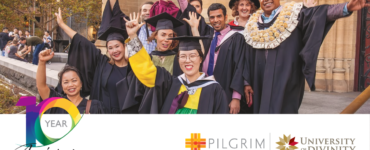What is the School of Graduate Research?
In January 2020 the University of Divinity will establish a School of Graduate Research (SGR) with responsibility for research training, including higher degree by research students and their supervisors. This new approach builds on a century’s experience in the education of doctoral graduates in theology, ministry, and related disciplines.
This decision of the University Council follows a recent review of the University’s Higher Degree by Research (HDR) Learning Environment, chaired by Professor Terry Evans (Deakin). The Evans Review received feedback from over 80 current and former research students of the University.
The primary recommendation of the Evans Review was the establishment of a School of Graduate Research, “to foster and manage the HDR learning environment, its supervisors and candidates”. The SGR should aim “to become a high-quality body encompassing all stages of candidature from pre-enrolment information and advice through to post-candidature (alumni) guidance and networking”.
This recommendation is modelled on the Schools of Graduate Research or similar entities found at most Australian Universities. Typically an SGR oversees administrative processes and provides academic supports such as orientation or career development programs which are specific to HDR candidature, while individual faculties or schools provide the research expertise relevant to a student’s research project.
At the University of Divinity, the SGR will provide increased University-wide support – and accountability – for all research students and supervisors (including both HDR and Minor Thesis programs). It aims to ensure consistent, high-quality outcomes for all students, and to increase the resources available to prepare applicants, students and graduates for the changing needs of research training, communication and engagement in the contemporary world. This support will be provided by two new full-time staff, the SGR Dean and SGR Registrar, whose responsibilities are entirely dedicated to the SGR.
Existing College-based programs and resources will continue alongside the SGR, including recruitment, delivery of research seminars and providing pastoral and practical support. Governance of the SGR in 2020 will remain with the University’s Research Committee, which will include the SGR Dean and a research-active staff member from each of the University’s Colleges.
The SGR will commence with around 270 members – around 100 HDR students, 50 Minor Thesis students, and 120 supervisors. As such, it will highlight both the vibrant strength of the University’s current research training activities and the opportunity to build greater collaboration into the future.
What does the SGR mean for students?
From January 2020, students enrolled in an HDR or in the Minor Thesis will be members of both the SGR and a College of the University. SGR membership will be conferred automatically on all existing students in these programs, and on new students by virtue of admission to an HDR or enrolment in the Minor Thesis.
As members of the SGR, students will be entitled to access a range of programs to support their successful completion, including existing initiatives such as the orientation program, annual Research Conference, HREC training, Thesis Boot Camp, and Research Methodologies. These will be supplemented over time by new programs in areas such as preparation for confirmation, publishing and presenting research, research skills and career development. SGR members will receive regular bulletins advertising research seminars and research training events and opportunities to apply for grants and scholarships. Students will have access to the SGR Dean and SGR Registrar as well as College-based staff for advice, help and support for the duration of their candidature from application to graduation – and beyond.
What does the SGR mean for supervisors?
From January 2020, to be eligible to supervise an HDR or Minor Thesis, a person will need to become a member of the SGR. Eligibility for membership will remain unchanged from present accreditation requirements for supervisors set out in the University’s Academic Staff Policy (sections 6.5 and 7.4) and the Supervisors Policy.
All current HDR and Minor Thesis supervisors will automatically become members of the SGR, for a transitional period of two years to 31 December 2021. A person may become a member of the SGR as a supervisor even if that person is not presently supervising a thesis, providing an easy way to identify staff who are available as supervisors for prospective students. Membership requirements may change as the SGR develops, however any new requirements would be subject to approval by the Academic Board on the advice of its Research Committee or equivalent.
Over time, the SGR will improve support for both new and experience supervisors and improve quality assurance by providing training and professional development. As SGR members, supervisors will also receive regular news of research seminars and research training events. The SGR Dean and SGR Registrar will be available to provide advice, help and support to supervisors, both new and experienced, in delivering a high quality research training experience for students, from the Minor Thesis to the PhD.
Who will lead the SGR?
The University has announced the appointment of Associate Professor Elizabeth Boase as Dean and Dr Suman Kashyap as Registrar of the University’s new School of Graduate Research, commencing in 2020. You can read more about Liz and Suman here.







This sounds good. Will the SGR still be housed in Pilgrim? As long as they are not all housed in Kew it should help to promote some more collegiality.